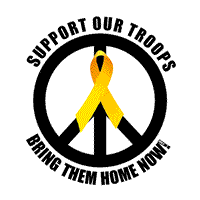Sad State of Affairs
Yesterday, while browsing for books at Borders, I encountered the poster child for Jewish education. There were actually two of them, but from what I gathered only one was Jewish. Both looked like they'd missed the memo that Punk was over. First they seemed completely unable to figure out where the Judaica section was, despite the fact that they walked past it--and me--at least five times. I would have helped them at this point, but I wasn't yet aware of what they were searching for. Apparently the goy wanted to buy a copy of the Torah. He and his Jewish girlfriend were seemingly baffled that all they could find were Tanakh's (which he pronounced Tanakah, which is odd since he professed later that he was learning Hebrew) and Jewish Bibles (Which confused her to no end because The Bible is obviously a Christian book. Why, she kept lementing, would they call the Jewish scripture a Bible?). Since they seemed to be looking for a Hebrew text I pointed them in the direction of the JPS Hebrew-English Tanakh, which is the one I use for daily study, and went about my buisness. They were immediately put off by the $40 price tag, saying that "you could by a Torah scroll for that much!" After perusing the Tanakh they turned their attention to "Judaism for Dummies," which in hindsight was probably a better choice for them. For the next 20 minutes or so they loudly complained about the "obvious" errors in the text and figured that it must have been written by Christians who didn’t know any better (A quick look at the cover would have proven this theory wrong, as it would have shown them that the book was co-written by Rabbi Ted Falcon, PhD, who probably knows more about Judaism then they do, but that’s just a guess). A few of their complains were:
- The book’s description of a menorah having either seven or nine branches (The seven branched version is a proper menorah, the nine branched version is a Hanukkah menorah/Hanukkiah), since—according to them a menorah has eight branches, one for each day of Hanukkah.
- The thought that the purpose of Yom Kippurim, the Day of Atonements, is the atonement of sins. "Do Jews have sins?" asked the blue haired goy. "No," answered his florecent red headed girlfriend, "Because we don’t believe in Hell, so we don’t believe in sins either. That’s a Christian thing." First, Hell is seen by Christians as, among other things, one of the post-death punishments for excessive sinning. Just because one doesn't believe in a particular punishment doesn't mean one doesn't believe in the crime. I know quite a few Christians who don't believe in Hell, does this mean they don't believe in sin either? Second, any religion which has the concept of divine laws has by definition the concept of sin, which can be seen as either the breaking of said laws or just the failier to meet the standards of the law. Third. if we don't believe in sin, what are we atoning for exactly? Or is Yom Kippurim just a nice excuse to starve ourselves once a year? And if Judaism doesn't have a concpet of sin, why does it have the concept of a sin offering?
- They greatly disagreed with the descriptions of the laws of Kashrut in the book. The pair apparently believe that not all shell fish are traif, separation of meat and dairy only counts for "really observant Jews" (of course, not observing a law doesn't make it any less of a law).
The goy was apparently trying to show off his Hebrew skills to his girl by reading aloud from the "Tanakah" and found that he could just barely read the first two words (And I think he only got the first because--being the Hebrew title of the book--it was transliterated at the top of the page.
Is this kind of ignorance common in the Jewish community? I found the whole thing absolutely appauling. If this is the fruit of liberal Judaism then the Orthodox are correct in thier prediction thatLiberal Judaism is dying a slow death.













0 comments:
Post a Comment